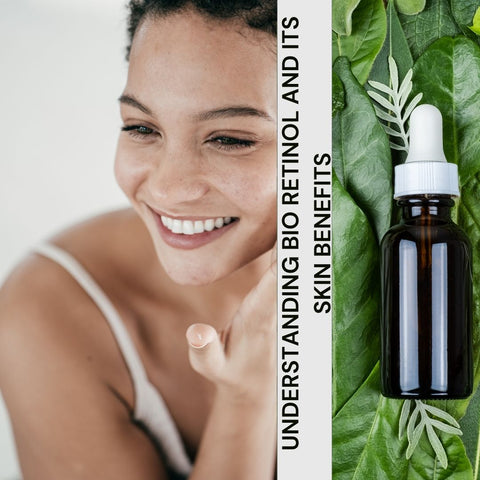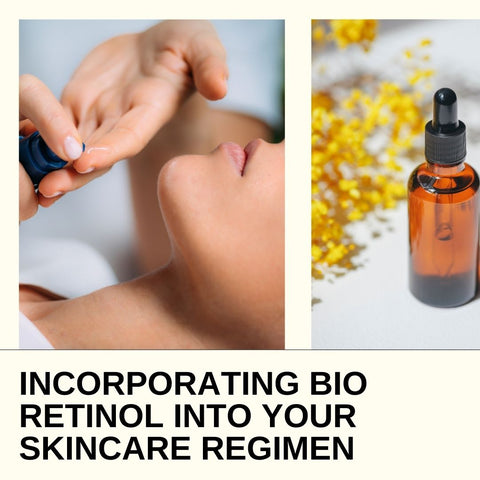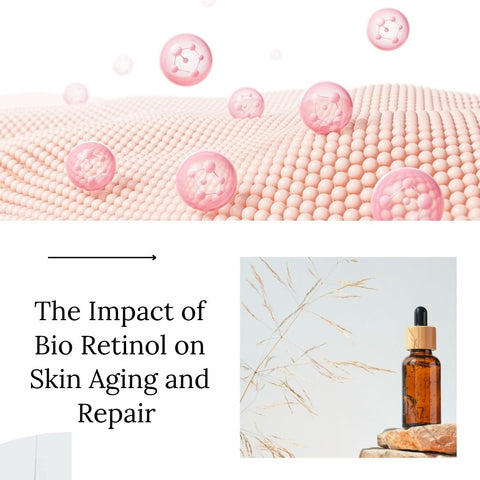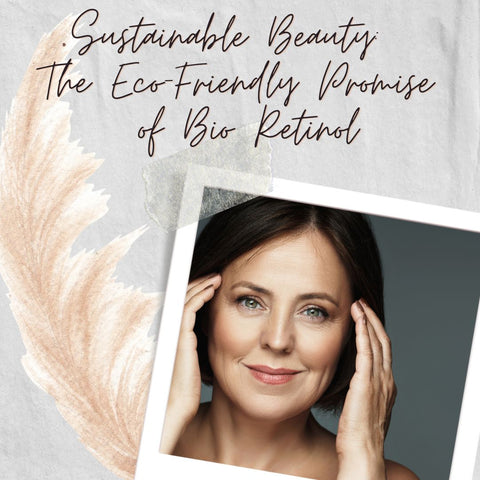In a realm where skincare innovations often lean on synthetic compounds, bio retinol emerges as a revolutionary approach, harnessing the power of nature to transform skin health. Unlike its traditional counterpart, bio retinol is derived from natural sources such as bakuchiol, rosehip seed oil, and carrot seed oil, offering a gentle yet potent alternative for rejuvenating the skin. This botanical treasure trove stimulates collagen production, promotes cell turnover, and diminishes the signs of ageing, all while embracing the soothing embrace of Mother Nature. With its gentle touch and remarkable efficacy, bio retinol is revolutionising skincare, paving the way for a more holistic approach to beauty that honours the skin and the environment alike.
But you are unaware about Bio Retinol and its numerous benefits and want to know about it in detail? Look no further. We, at Clinikally, have come to your rescue to make you aware about the same. While consulting a dermatologist is always the safest option, delving into the benefits of this natural ingredient can prove to be a wholesome experience for you!
Understanding Bio Retinol and Its Skin Benefits

Bio retinol, a plant-based alternative to traditional retinol, has been gaining traction in the skincare world for its remarkable benefits. Derived from natural sources such as bakuchiol, rosehip seed oil, and carrot seed oil, bio retinol offers a gentler yet equally effective approach to improving skin health. Its unique composition harnesses the power of botanicals to stimulate collagen production, promote cell turnover, and reduce the appearance of fine lines and wrinkles. Unlike synthetic retinol, bio retinol is less likely to cause irritation or sensitivity, making it suitable for all skin types, including those with sensitive or reactive skin. This natural alternative also boasts antioxidant properties that protect against environmental damage, resulting in a brighter, more youthful complexion. Incorporating bio retinol into your skincare routine can help you achieve smoother, firmer skin without the harsh side effects often associated with traditional retinol products. It provides ample benefits to the skin such as :
-
Stimulation of collagen production for firmer, more elastic skin.
-
Promotion of cell turnover, revealing a smoother, brighter complexion.
-
Reduce the appearance of fine lines, wrinkles, and other signs of ageing.
-
Gentle formula suitable for all skin types, including sensitive skin.
-
Provides antioxidant protection against environmental stressors.
-
Supports overall skin health and vitality.
The Natural Composition of Bio Retinol and Its Sources
Natural retinoids are usually found in living organisms as preformed vitamin A or carotenoid. These play essential roles in various biological processes of the body. Different natural retinoids have therapeutic potential in treating skin disorders. Bio retinol, often referred to as a natural alternative to commonly used retinol, is derived from plant-based sources and can be found in various natural ingredients. However, it is not as potent as synthetic retinol, but it offers a milder, gentler approach to skincare. Enlisting certain natural sources of Bioretinol below:
-
Rosehip Oil: It is abundant in natural vitamin A, which is a key component of bio retinol. It helps improve skin texture, reduce fine lines, and promote skin renewal.
-
Carrot Seed Oil: Rich in carotenoids, these are converted into vitamin A by the body. This, in turn, supports skin health and provides mild retinol-like benefits.
-
Bakuchiol: Bakuchiol is a plant extract derived from the Babchi plant. It has recently gained popularity as a natural retinol alternative as it is able to promote smoother skin and reduce the appearance of wrinkles.
-
Rosemary Extract: Being a treasure trove of antioxidants, Rosemary extract can help protect the skin from damage caused by free radicals and support overall skin health.
-
Algae Extract: Algae extracts, usually obtained from brown and red algae, are rich in vitamins, minerals, and antioxidants. They can offer skin benefits similar to bio retinol.
-
Moth Bean Extract: Moth bean extract is rich in natural retinol-like compounds that aid the skin in renewal process and collagen production.
-
Acai Oil: Being abundantly packed with antioxidants and vitamin A, Acai Oil helps to improve skin texture and reduce signs of ageing.
-
Green Tea Extract: Green tea extract is known for its antioxidant properties. It protects the skin from environmental damage and promotes a healthy complexion.
-
Sea Buckthorn Oil: Sea buckthorn oil is a rich source of natural vitamin A and carotenoids. This aids in nourishing and revitalising the skin.
-
Evening Primrose Oil: Evening primrose oil contains gamma-linolenic acid (GLA) and vitamin A precursors, which can support skin health.
Summarising it in the table below:
|
Natural Source |
Benefits |
|
Rosehip Oil |
Improves skin texture, reduces fine lines |
|
Carrot Seed Oil |
Supports skin health, provides retinol-like benefits |
|
Bakuchiol |
Promotes smoother skin, reduces wrinkles |
|
Rosemary Extract |
Protects skin from free radicals, supports skin health |
|
Algae Extract |
Offers skin benefits similar to bio retinol |
|
Moth Bean Extract |
Aids in skin renewal, collagen production |
|
Acai Oil |
Improves skin texture, reduces signs of ageing |
|
Green Tea Extract |
Protects skin from environmental damage |
|
Sea Buckthorn Oil |
Nourishes and revitalises the skin |
|
Evening Primrose Oil |
Supports skin health |
For people having sensitive skin, these natural sources of bio retinol can prove to be extremely beneficial as these can provide milder alternatives to synthetic retinol for those with sensitive skin or those seeking more natural skincare options.
Bio Retinol vs. Traditional Retinol: A Gentler Approach
In the realm of skincare, bio-retinol emerges as a revolutionary alternative, offering a unique and gentler approach to traditional retinol. Unlike its lab-manufactured counterpart, Bio-retinol derives its potency from natural sources such as bakuchiol, rosehip seed oil, and carrot seed oil, among others. This botanical blend not only mimics the skin-renewing benefits of retinol but also brings additional nourishment and soothing properties to the table. What sets bio-retinol apart is its ability to deliver transformative results without the harsh side effects commonly associated with traditional retinol, such as redness, dryness, and sensitivity. By harnessing the power of nature, bio-retinol offers a holistic approach to skincare, catering to individuals with sensitive skin or those seeking a gentler yet equally effective anti-aging solution.
The unique composition of bio-retinol makes it suitable for a wide range of skin types, including those with delicate or reactive skin. Its soothing and hydrating properties help to mitigate irritation and inflammation, while still promoting collagen production and cellular turnover for improved texture and firmness. Additionally, bio-retinol has an antioxidant-rich formula that provides protection against environmental aggressors, helping to combat premature ageing and maintain skin health. Whether incorporated into daily skincare routines or used as targeted treatments, bio-retinol offers a versatile solution for addressing various skin concerns while promoting overall skin wellness. With its natural origins and gentle yet potent effects, bio-retinol represents a new era in skincare, where efficacy meets sustainability and sensitivity is embraced rather than challenged.
Bio Retinol & Traditional Retinol: A Comparison
Bio-retinol and traditional retinol are both skincare ingredients known for their anti-aging properties and ability to improve skin texture and tone. However, there are several key differences between the two.
-
On the basis of source; traditional retinol is a synthetic/ laboratory manufactured form of vitamin A that is chemically identical to the retinol found in the body. Bio-retinol, on the other hand, is derived from natural sources such as plants, seeds, and algae. It contains compounds that mimic the effects of retinol without being chemically identical.
-
Traditional retinol is known for its high potency and efficacy in stimulating collagen production, increasing cell turnover, and reducing the appearance of wrinkles and fine lines. Bio-retinol, while effective, is generally milder and may take longer to produce noticeable results compared to traditional retinol. It may be better suited for individuals with sensitive skin or those who cannot tolerate traditional retinol.
-
Also, traditional retinol is associated with potential side effects such as dryness, irritation, redness, and increased sensitivity to sunlight, especially when first starting to use it. In contrast, bio-retinol tends to be gentler on the skin and may cause fewer side effects, making it a more suitable option for those with sensitive or reactive skin.
-
Traditional retinol is also relatively stable and can remain effective in skincare formulations for extended periods. However, bio-retinol may be less stable and more prone to degradation over time, which can affect its effectiveness in skincare products.
-
Traditional retinol is widely available in skincare products, including over-the-counter creams, serums, and prescription treatments, but, Bio-retinol is becoming increasingly popular in the skincare market as consumers seek more natural and sustainable alternatives. It is often found in products labelled as "natural," "organic," or "plant-based."
Presenting all these key differences in a table below:
|
Feature |
Bio-Retinol |
Traditional Retinol |
|
Source |
Derived from natural sources such as plants, seeds, and algae |
Synthetic form of vitamin A |
|
Potency |
Generally milder, may take longer to produce noticeable results |
High potency, known for rapid results |
|
Side Effects |
Fewer side effects, gentler on the skin |
Potential for dryness, irritation, and increased sensitivity |
|
Stability |
Less stable, may degrade more quickly |
Relatively stable, remains effective over time |
|
Availability |
Increasingly available in natural skincare products |
Widely available in both OTC and prescription formulations |
In summary, while both traditional retinol and bio-retinol offer anti-aging benefits for the skin, they differ in their source, potency, side effects, stability, and availability. Bio-retinol may be preferred by individuals seeking a more natural and gentle alternative to traditional retinol or those with sensitive skin.
Harnessing the Power of Plant-Based Retinol for Skin Health
Plant-based retinol, also known as bio-retinol, is revolutionising the skincare industry with its natural approach to promoting skin health. Derived from botanical sources such as plants, seeds, and algae, bio-retinol offers a gentler alternative to traditional retinol while delivering impressive results.
Bio-retinol is a natural marvel that is derived from plants, seeds, and algae; bio-retinol taps into the power of nature for skin rejuvenation. Bio-retinol offers a softer touch that is ideal for sensitive skin types as it provides effective skincare without irritation. Bio-retinol stimulates cellular turnover and collagen production, smoothes fine lines and wrinkles, thereby unveiling a radiant complexion.
Incorporating Bio Retinol into Your Skincare Regimen

Elevating your skincare regimen with bio-retinol introduces a natural and gentle approach to achieving radiant, youthful skin. Unlike traditional retinol, bio-retinol harnesses the power of botanical ingredients to deliver impressive results without the risk of irritation or sensitivity. Incorporating bio-retinol into your daily routine is a simple yet effective way to address common skincare concerns such as fine lines, uneven texture, and dullness. With its soothing properties, bio-retinol nurtures the skin while promoting cellular turnover and collagen production, resulting in a smoother, more luminous complexion over time. Whether you're new to retinol or have sensitive skin, bio-retinol offers a safe and gentle solution that respects the skin's natural balance.
Choosing the Right Bio Retinol Products for Your Skin Type
Understanding your skin type before choosing the type of bio-retinol for your skin in a crucial step. Bio-retinol can be incorporated into your skin type in many ways such as:
-
Serum : Bio-retinol can be used as a serum to aid in effective renewal of skin. Serum is a more potent form of a product.
-
Sleeping Mask : Extremely hydrating and ultra moisturising, bio-retinol can be incorporated into your skin as a sleeping mask.
-
Facial Cleansers : Bio-retinol can be incorporated into the skin care regimen in the form of face wash during morning and at bedtime.
-
Lotions/ Creams : Bio retinol can be used as a cream/lotion to help promote the synthesis of skin-friendly proteins such as collagen and elastin along with nourishing the skin.
However, it is always recommended to do a patch test before using the product, so as to prevent any sensitivity reactions.
The Ideal Routine: Integrating Bio Retinol for Maximum Effect
Bio-retinol is a treasure trove of various benefits to the skin. It provides numerous benefits without causing much harm. Below is the list of certain benefits:
-
Minimises the signs of ageing such as fine lines and wrinkles.
-
Decreases the pigmentation and reduces age spots.
-
Minimises sun induced damage.
-
Treats melasma.
-
Brightens the skin.
-
Makes the skin radiant.
-
Evens out the skin tone.
However, these benefits can be achieved and experienced only when the skin care is done regularly and diligently. Hence, incorporate bio retinol into your skin care diligently to avail maximum benefits.
Sensitive Skin and Bio Retinol: A Harmonious Match
While Retinol proves to be very harsh for people having sensitive skin; Bio-retinol comes to their rescue. With benefits at par with retinol, Bio-retinol offers gentle care to the sensitive skin. Bio-retinol is an effective, plant based product that can benefit the skin along with some tender care. Bio-retinol derives its power from natural sources, offering a soothing alternative for those with sensitive skin. This botanical marvel works harmoniously with the skin's natural processes, delivering visible results without the risk of irritation or discomfort.
It promotes cellular turnover and collagen production, thus rejuvenating the skin from within. This results in revealing a smoother, more radiant complexion over time. What sets bio-retinol apart is its ability to provide effective results without compromising on gentleness, making it suitable for even the most delicate skin types.
The Impact of Bio Retinol on Skin Aging and Repair

Bio Retinol, the natural form of Retinol, positively impacts skin ageing and repair. It boosts the production of collagen in the skin, improves and enhances the circulation and plumps the skin. This results in the appearance of younger looking and more radiant skin. As a result, there is a minimal appearance of signs of ageing, decreased fine lines and wrinkles, and minimum age spots.
Combatting Fine Lines and Wrinkles with Bio Retinol
As we age, there is a decline in the amount of collagen in the body. Collagen is like cement that holds skin cells together. Loss of collagen appears as a ‘break’ in skin, in the form of fine lines and wrinkles. Bio-retinol stimulates the production of collagen in the body. As a result, there is an enhanced rate of skin renewal. Hence, there is a decrease in the appearance of signs of ageing such as wrinkles and fine lines. Thus, Bio Retinol effectively combats the signs of ageing, that results in making the skin look more youthful and age defying.
Bio Retinol's Role in Sun Damage Repair and Prevention
Exposure to sun, often causes damage to skin, in the form of spots and hyperpigmentation. Bio Retinol increases the turnover of the skin by stimulating new cell formation. As a result, damaged cells are shed and replaced by new healthy cells. This results in unveiling a clear skin underneath.
Brightening and Even Skin Tone: The Bio Retinol Effect
By increasing the skin turnover and boosting blood circulation to the skin, Bio Retinol, enhances the radiance and brightness of the skin. This makes the skin appear bright, youthful and radiant. This all is achieved in a gentle way, without many side effects.
From its origins in nature to its transformative effects on the skin, bio-retinol represents a harmonious fusion of science and botanical wisdom, offering a holistic approach to skincare that respects and honours the delicate balance of the skin. With bio-retinol, individuals can embark on a journey towards healthier, more radiant skin, embracing the power of nature to nurture and revitalise their complexion and skin appearance.
Summarising the anti-ageing benefits in a tabulated manner below for a better understanding:
|
Aspect |
Description |
|
Combatting Fine Lines and Wrinkles with Bio Retinol |
Bio Retinol stimulates collagen production, enhancing skin renewal and reducing the appearance of fine lines and wrinkles. |
|
Bio Retinol's Role in Sun Damage Repair and Prevention |
Bio Retinol increases skin turnover, shedding damaged cells and replacing them with healthy ones, reducing spots and hyperpigmentation caused by sun damage. |
|
Brightening and Even Skin Tone: The Bio Retinol Effect |
Bio Retinol boosts skin turnover and blood circulation, resulting in brighter, more radiant skin with an even tone. |
|
Harmonious Fusion of Science and Botanical Wisdom |
Bio Retinol represents a blend of scientific innovation and natural botanicals, offering a holistic approach to skincare. |
|
Journey towards Healthier, More Radiant Skin |
With Bio Retinol, individuals can achieve healthier, more radiant skin, embracing the power of nature for revitalisation. |
Sustainable Beauty: The Eco-Friendly Promise of Bio Retinol

Unlike traditional retinol, which is synthesised in a lab, bio-retinol is extracted from natural sources. This makes it appealing to those seeking skincare products with minimal synthetic ingredients and a focus on sustainability. By harnessing the power of plants, bio-retinol supports sustainable beauty practices that prioritise environmental responsibility. Sustainable sourcing and production methods ensure that skincare products containing bio-retinol are not only effective but also eco-friendly.
















